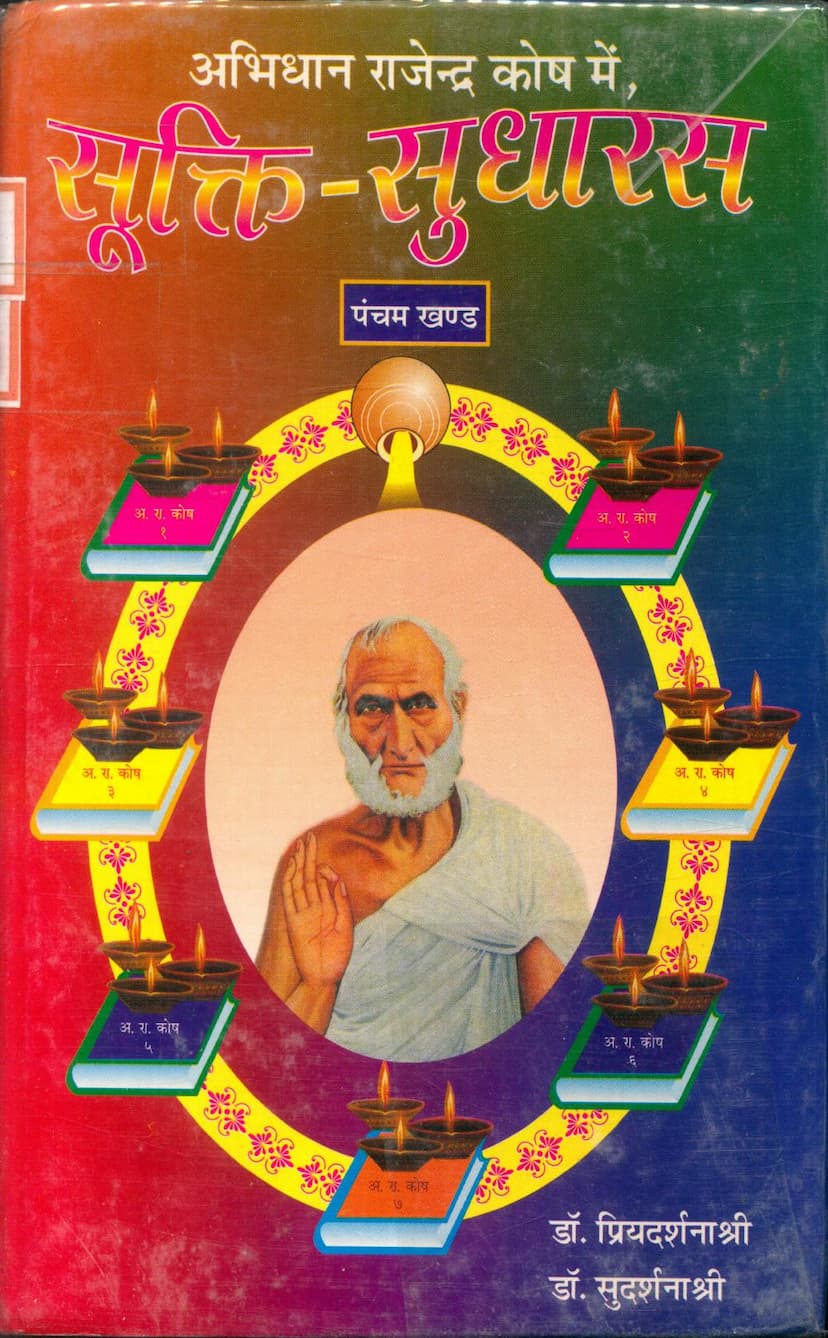Abhidhan Rajendra Koshme Sukti Sudharas Part 05
Added to library: September 1, 2025

Summary
This document is the fifth volume of the "Abhidhan Rajendra Kosh mein Sukti Sudharas" (Essence of Sayings within the Abhidhan Rajendra Kosh) series. This particular volume focuses on the philosophical and ethical teachings found within the extensive "Abhidhan Rajendra Kosh," a monumental Jain encyclopedia compiled by the revered Acharya Shrimad Vijay Rajendrasurishwarji Maharaj.
Here's a breakdown of the key information presented in the provided pages:
Book Details:
- Title: Abhidhan Rajendra Kosh mein Sukti Sudharas, Pancham Khand (Volume 5)
- Authors: Sadhvi Dr. Priyadarshanashreeji, Sadhvi Dr. Sudarshanashreeji
- Publisher: Khubchandbhai Tribhovandas Vora
- Catalog Link: https://jainqq.org/explore/002320/1
Core Theme:
The series "Sukti Sudharas" aims to distill the wisdom (sukti) from the vast "Abhidhan Rajendra Kosh" into an accessible and nectar-like form (sudharas). This fifth volume presents a selection of these profound sayings, categorized and explained by the authors.
About Acharya Shrimad Vijay Rajendrasurishwarji Maharaj ("Vishwapujya Shri"):
The document extensively details the life and legacy of Acharya Rajendrasurishwarji, who is reverentially referred to as "Vishwapujya" (Worshipped by the Universe).
- Birth: December 3, 1827, in Bharatpur, Rajasthan.
- Name at Birth: Ratnaraj.
- Parents: Kesar Devi and Shrimad Rishabhdasji.
- Initiation (Diksha): 1845 in Udaipur.
- Education: Studied extensively under his guru, mastering grammar, logic, philosophy, poetry, lexicography, and 45 Jain Agamas with precision.
- Ascension to Acharya: 1868 in Ahor, Rajasthan.
- Major Contributions:
- "Abhidhan Rajendra Kosh": His magnum opus, a vast encyclopedia of Jain literature, which earned him the title "Vishwapujya."
- Scriptural Works: Authored 61 books, including the "Abhidhan Rajendra Kosh," "Paiyasaddamhi," "Kalpasutrarth Prabodhini," and a commentary on "Siddha-Hema."
- Temple Restoration and Establishment: Revitalized and established significant Jain pilgrimage sites like Bhandavpur, Korataji, Swargiri Jalor, Talanpur, and Mohan Kheda.
- Spiritual Practices: Undertook deep meditation and penance at Swargiri, Chamundavan, and Mangitungi hills.
- Philosophy and Message:
- Emphasized "Live and let live" ("Jiyo aur jeene do"), recognizing the interconnectedness of all beings through the principle of mutual aid ("Parasparopagrahajeevanam").
- Promoted non-violence (ahimsa) and a moral life.
- Stressed the importance of education and social upliftment.
- His life was a beacon of love and compassion.
- Demise: December 21, 1906, in Rajgarh, Dhar district, Madhya Pradesh.
- Samadhi Sthal: A magnificent, artistic samadhi temple at Mohan Kheda, attracting millions of devotees annually. A unique phenomenon reported on the pilgrimage day (Paush Shukla Saptami) is the dripping of "amrita-kesar" (nectar-like saffron).
- Global Presence: His statue is installed in a Jain temple in London.
The "Sukti Sudharas" Series:
- This fifth volume is published in honor of the "Vishwapujya Shrimad Vijay Rajendra Suri Shatabdi-Dashabdi Mahotsav" (Centenary-Decade Festival).
- The series aims to present the essence of the "Abhidhan Rajendra Kosh" through selected "suktis" (wise sayings).
- The authors, Sadhvi Dr. Priyadarshanashreeji and Dr. Sudarshanashreeji, are highly praised for their dedication, scholarship, and guru-bhakti in undertaking this immense task. They are described as constantly diving deep into the ocean of the "Abhidhan Rajendra Kosh" to bring forth its gems.
Content of Volume 5:
The volume is structured with various sections, including:
- Dedications and Greetings: From the authors and respected Jain scholars and monks.
- Forewords and Testimonials: Contributions from prominent figures in the Jain community and academia, praising the authors and the significance of the work.
- Table of Contents (Anukram): Outlining the various sections of the book.
- "Vishwapujya": Life Philosophy: A detailed biographical sketch of Acharya Rajendrasurishwarji.
- "Sukti Sudharas" (Fifth Volume): The main body of the text, containing the extracted and explained sayings.
- Appendices:
- First Appendix: Alphabetical Index of Sayings.
- Second Appendix: Index by Subject.
- Third Appendix: Index of "Abhidhan Rajendra Kosh" Page Numbers.
- Fourth Appendix: Index of Jain and non-Jain texts (Gathas/Shlokas).
- Fifth Appendix: Bibliography of reference works used in "Sukti Sudharas."
- Complete Works of Vishwapujya: A list of his literary contributions.
- Significant Works of the Authors: A list of other notable works by the two Sadhvis.
Key Sayings (Suktis) Presented in Volume 5:
The bulk of the content consists of classified sayings from various Jain scriptures (like Uttaradhyayana Sutra, Acharya Sutra, Nandi Sutra, etc.) and some from non-Jain sources, often with explanations and references to the "Abhidhan Rajendra Kosh" and the original source. The categories of sayings cover a wide range of ethical, philosophical, and practical aspects of Jainism, including:
- Principles of conduct: For monks, householders, and society.
- Ethics and Morality: Truthfulness, non-violence, non-stealing, celibacy, contentment, forbearance, etc.
- Spiritual Practices: Meditation, self-control, knowledge, devotion, penance, study.
- Nature of the Soul and Karma: Attachment, detachment, liberation, the cycle of birth and death.
- Dangers of Desire and Attachment: Greed, lust, ego, anger, pride, deceit, and their consequences.
- Importance of Wisdom and Knowledge: The role of right perception, knowledge, and conduct.
- The Way of the Ascetic: Rules and regulations for monks and nuns.
- Universal Principles: Compassion, equality, and the interconnectedness of all life.
The volume is highly appreciated by scholars for its meticulous research, clear explanations, and the valuable service it renders in making the profound wisdom of Jainism accessible to a wider audience. It is seen as a significant contribution to Jain literature and a testament to the enduring legacy of Acharya Rajendrasurishwarji.